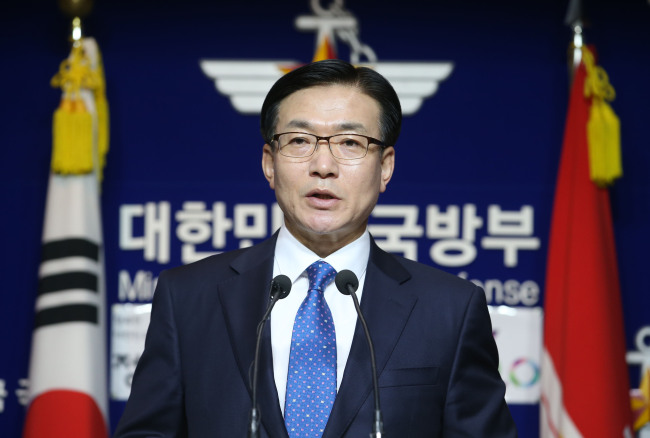South Korea’s Defense Ministry said Tuesday it will seek military cooperation with African countries during President Park Geun-hye’s upcoming visit to the continent.
Boosting relations with Uganda, in particular, is expected to further pressure North Korea, which has had long-standing ties with the African country and is currently under U.N.-led economic sanctions as punitive actions for its nuclear and ballistic missile programs.
In a press briefing, ministry spokesman Moon Sang-kyun said that Vice Defense Minister Hwang In-moo will accompany Park on her weeklong trip to Ethiopia, Uganda and Kenya. The president is set to depart Seoul on Wednesday en route to Addis Ababa, her first destination of the trip.
Boosting relations with Uganda, in particular, is expected to further pressure North Korea, which has had long-standing ties with the African country and is currently under U.N.-led economic sanctions as punitive actions for its nuclear and ballistic missile programs.
In a press briefing, ministry spokesman Moon Sang-kyun said that Vice Defense Minister Hwang In-moo will accompany Park on her weeklong trip to Ethiopia, Uganda and Kenya. The president is set to depart Seoul on Wednesday en route to Addis Ababa, her first destination of the trip.

Moon said Hwang’s visit is related to military cooperation between Seoul and Kampala, but did not elaborate on the matter, stressing that it is closely related to the two countries’ upcoming summit.
Hwang is expected to discuss military cooperation with the three African countries
A ministry official was quoted by local media saying it plans to gradually expand collaboration, including the operation of an exchange program of personnel.
While officials say strengthening the relatively thin ties with all three countries will have significant meaning, establishing stronger relations with Uganda is anticipated to bring pressure upon already-sanctioned North Korea.
Pyongyang has retained close relations with Kampala since establishing diplomatic ties in 1963. It was reported last year via a U.N. report that North Korean instructors were training police officers in the outskirts of the Ugandan capital, as part of the mutual military cooperation deal inked the year before.
In March, Uganda was accused of violating the U.N. Security Council Resolution 2270, which tightens arms embargo and bans hosting of the North’s trainers or advisers for police training. Uganda refused to comment on the matter.
But there have been signs of possible rifts growing between the countries.
It was revealed in October that Ugandan President Yoweri Museveni repeatedly rejected the North’s offer to present him its most prestigious Kim Il-sung award, named after its founder and the grandfather of incumbent leader Kim Jong-un.
Seoul, on their part, has been seeking to boost military ties with Uganda and other African nations. Last year, the Defense Ministry dispatched military attache -- field officers attached to a diplomatic mission -- to Ethiopia and Uganda for the first time.
A diplomatic source indicated that Uganda is looking to curb it military ties with the North while strengthening cooperation with Seoul.
Park’s attempt to pressure North Korea -- against whom she has retained a hard-line approach -- via embracing African countries was reminiscent of moves made by her father Park Chung-hee, former leader of South Korea from 1961-1979. It was during the elder Park’s time in office that the three countries established diplomatic relationships with Seoul.
By Yoon Min-sik (minsikyoon@heraldcorp.com)
Hwang is expected to discuss military cooperation with the three African countries
A ministry official was quoted by local media saying it plans to gradually expand collaboration, including the operation of an exchange program of personnel.
While officials say strengthening the relatively thin ties with all three countries will have significant meaning, establishing stronger relations with Uganda is anticipated to bring pressure upon already-sanctioned North Korea.
Pyongyang has retained close relations with Kampala since establishing diplomatic ties in 1963. It was reported last year via a U.N. report that North Korean instructors were training police officers in the outskirts of the Ugandan capital, as part of the mutual military cooperation deal inked the year before.
In March, Uganda was accused of violating the U.N. Security Council Resolution 2270, which tightens arms embargo and bans hosting of the North’s trainers or advisers for police training. Uganda refused to comment on the matter.
But there have been signs of possible rifts growing between the countries.
It was revealed in October that Ugandan President Yoweri Museveni repeatedly rejected the North’s offer to present him its most prestigious Kim Il-sung award, named after its founder and the grandfather of incumbent leader Kim Jong-un.
Seoul, on their part, has been seeking to boost military ties with Uganda and other African nations. Last year, the Defense Ministry dispatched military attache -- field officers attached to a diplomatic mission -- to Ethiopia and Uganda for the first time.
A diplomatic source indicated that Uganda is looking to curb it military ties with the North while strengthening cooperation with Seoul.
Park’s attempt to pressure North Korea -- against whom she has retained a hard-line approach -- via embracing African countries was reminiscent of moves made by her father Park Chung-hee, former leader of South Korea from 1961-1979. It was during the elder Park’s time in office that the three countries established diplomatic relationships with Seoul.
By Yoon Min-sik (minsikyoon@heraldcorp.com)







![[Graphic News] More Koreans say they plan long-distance trips this year](http://res.heraldm.com/phpwas/restmb_idxmake.php?idx=644&simg=/content/image/2024/04/17/20240417050828_0.gif&u=)
![[KH Explains] Hyundai's full hybrid edge to pay off amid slow transition to pure EVs](http://res.heraldm.com/phpwas/restmb_idxmake.php?idx=644&simg=/content/image/2024/04/18/20240418050645_0.jpg&u=20240419100350)






![[From the Scene] Monks, Buddhists hail return of remains of Buddhas](http://res.heraldm.com/phpwas/restmb_idxmake.php?idx=652&simg=/content/image/2024/04/19/20240419050617_0.jpg&u=20240419175937)

![[KH Explains] Hyundai's full hybrid edge to pay off amid slow transition to pure EVs](http://res.heraldm.com/phpwas/restmb_idxmake.php?idx=652&simg=/content/image/2024/04/18/20240418050645_0.jpg&u=20240419100350)

![[Today’s K-pop] Illit drops debut single remix](http://res.heraldm.com/phpwas/restmb_idxmake.php?idx=642&simg=/content/image/2024/04/19/20240419050612_0.jpg&u=)